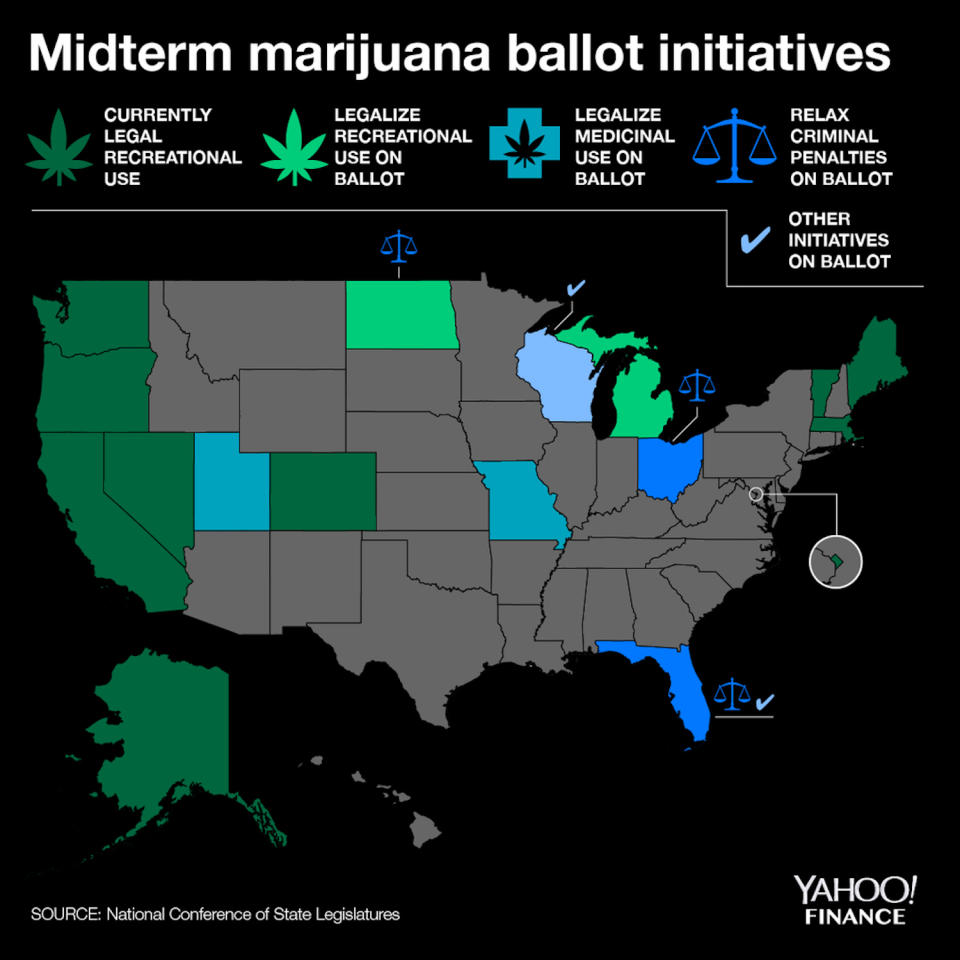These 6 states will have weed-related ballot initiatives on Tuesday
Tuesday’s midterm elections could make recreational marijuana legal in two more states.
Voters who show up to the polls in Michigan and North Dakota on November 6 decide whether to green-light recreational use. If approved, the states will join nine others, plus Washington D.C., where recreational use is already legal — Washington, Oregon, Nevada, California, Colorado, Alaska, Vermont, Maine and Massachusetts.
Less aggressive cannabis-related measures are at stake in Missouri, Utah, Florida and Ohio. And races in Florida and Kentucky, viewed by some as referendums on pot, could tip the likelihood of expanded legalization.
Here’s a closer look at state ballot initiatives and races across the country.

Michigan
Michigan’s Hemp Legalization Initiative, or Proposal 1, would legalize recreational use for those 21 and older, yet leave it up to municipalities whether to keep recreational use illegal and ban or restrict commercial enterprise within their boundaries. If passed, the bill would permit industrial hemp production and let individuals grow up to 12 cannabis plants at a time. Public consumption would remain prohibited. Michigan’s bill proposes one of the lowest cannabis tax levels in the nation. Retailers would pay a 10 percent excise tax, proceeds of which would go to local governments, education and infrastructure expenses, and consumers would pay a 6 percent sales tax, the same rate already imposed on the state’s retail goods.
Polling conducted in Michigan between October 25 -27 by The Detroit News shows 57% of likely voters in favor of legalized recreational use.
North Dakota
North Dakota’s Measure 3 initiative takes its legalization bill one step further, matching Michigan’s 21-year-old age requirement, plus providing automatic expungement of criminal records for certain drug offense convictions, including certain marijuana violations. Critics say the bill doesn’t go far enough because it fails to lay out regulatory and enforcement details. All marijuana sales in North Dakota would fall under the state sales tax of 5 percent, with additional local taxes that range from 5 percent to 8.5 percent, according to Cole Haymond, a Connecticut resident and Advisor for Legalize ND who joined the effort to legalize marijuana in North Dakota.
North Dakota polls have been mixed, with an October 11 – 14 poll finding 51% of likely voters in favor of legalized recreational use and 36% against, contrary to an earlier October poll finding 59% against the measure, 30% in favor, and 11% undecided.
Florida
On Florida’s November ballot, voters will have the chance to repeal a state constitutional provision that keeps alleged and convicted marijuana drug offenders on the hook, even if the state decriminalizes the drug. Amendment 11 would relax the current rule that says violators can still be prosecuted even if the state’s criminal statutes are amended. The governor’s race in Florida is also viewed by some as a referendum on recreational legalization. Democratic candidate and Tallahassee Mayor Andrew Gillum supports recreational legalization. His opponent, U.S. Representative Ron DeSantis, has expressed concern about marijuana getting into the hands of minors. DeSantis voted against a measure that would have made marijuana access and use easier for veterans. Both candidates support medicinal use, which is already permitted under state law.
Kentucky
In Kentucky, marijuana use remains fully illegal, though both Republican and Democratic lawmakers are behind proposals for change. Republican state senator, Dan Seum, who led a legislative effort introducing SB 80 to legalize recreational cannabis beginning in January this year, is vying for reelection. He and other lawmakers view legalization as a way to dig the state out of mounting debt by bringing in an estimated $100 million in new tax revenues. The state’s House Bill HB 166 stalled in March, which would have made marijuana available for certain patients with “qualifying debilitating illness.”
Missouri
Missouri voters are slated to decide on medical marijuana with Amendment 2. If approved, a medical use enterprise tax will be assessed to sellers with 15 percent going to a new Biomedical Research and Drug Development Institute that would conduct research on cancer and other diseases, plus act as an industry regulator. A 2 percent tax would go to a collective pool for veteran healthcare, childhood education, drug treatment and public safety, and an additional 4 percent towards veteran healthcare.
Ohio
Ohio’s Issue 1, the Drug and Criminal Justice Policies Initiative, asks voters whether a state constitutional amendment should downgrade felony drug possession and use offenses to misdemeanors. The downgrade would include marijuana use and possession offenses.
Utah
Midterm voters in Utah will decide on the state’s Medical Marijuana Legalization Initiative Proposition 2 that would permit medical use for medical card holders with qualifying illnesses. If passed, it would authorize a limited number of licensed facilities to cultivate, test and dispense marijuana, and permit medical card holders to grow up to six marijuana plants. Opponents of the bill say its imposition of limited dispensaries will force consumers to rely on the black market, defeating the measure’s intent. Under Utah’s current law, only the state is authorized to grow, process or sell cannabis, and sales are limited to people who are terminally ill with less than 6 months to live and “qualified research institutions.”
Wisconsin
A set of questions on the ballots in 16 Wisconsin Counties will ask voters their preferences on recreational versus medicinal marijuana legalization. Answers can then be shared with state lawmakers to guide state policies on cannabis use. The state currently limits medical marijuana use to low level THC cannabinoid products.
*This article has been updated to include recent polling data for Michigan and North Dakota.
Alexis Keenan is a New York-based reporter for Yahoo Finance. She previously produced live news for CNN and MSNBC and is a former litigation attorney.
Read more:
Why Philadelphia halted plans to unleash e-scooters across the city
Here’s how eBay alleges Amazon illegally lured its ‘high-value’ sellers
Winning the Mega Millions is sweeter in some states than others
